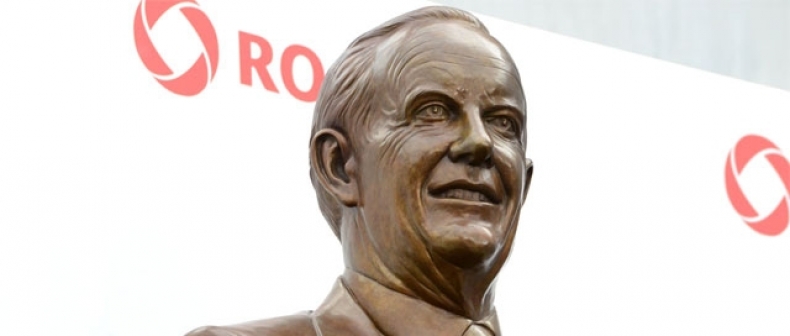
Unconfirmed reports have been emerging about a miracle outside of the Rogers Centre. The 12-foot tall statue of The Venerable Ted Rogers has been said to be shedding tears from his bronzed eyes. Whether as metaphor for the virtues of trickle down economics, or in sorrow over a recent campaign to rename the stadium he posthumously purchased to the completely non-descriptive moniker “The Skydome,” we can only guess. Postulators from Rogers Cable have been dispatched to assess the case for beatification, they will arrive between noon and 5 p.m. sometime during the week. They ask that someone remain home to answer the door. They are busy, and have other calls to attend to. In the meantime, speculation has emerged that Ted’s tears are actually over the federal government’s telecommunication policy which has many believing that the American goliath Verizon Communications Inc. may be coming to Canada. Rogers Communications Inc., along with BCE Inc., and Telus Corp., have put aside their sectarian disagreements to rally against this new threat to the orthodoxy of Canadian protectionism.
At issue is the recent interest Verizon has shown in entering the Canadian telecommunications market by purchasing Wind Mobile, Mobilicity, or perhaps both. Regulations prevent the Big 3 Canadian telecom firms from making such an offer, to prevent the three, who already have 90% of wireless subscribers between them, from claiming too large a market share. Though reports suggest it has backed off from negotiations, should the American giant wish to submit an application for an upcoming spectrum auction by September 17, auction rules would forbid it from discussing any mergers or buyouts until next year.
The spectrum auction in January will see the federal government selling off four blocks of 700MhZ bandwidth − considered prime real estate by those who prefer terrestrial metaphors to describe broadcast signals. The Big 3 will each be eligible to bid on one of two blocks, and Verizon will be able to bid on up to two different blocks set aside for new entrants, another possible reason they may be waiting until after the auction to purchase smaller wireless carriers.
For the incumbents, these are the two cardinal errors of federal policy which have them railing against perceived indulgences: The setting aside of two blocks of spectrum for newcomers, and Verizon’s freedom to buy up the smaller carriers. Verizon is a massive company, four times bigger than the entire Canadian telecom industry, and in no need of help to establish itself in this country, they claim. While this line of reasoning may be true, it is entirely beside the point. The Harper government has repeatedly stated its aim is to encourage a more competitive industry, one not dominated by three large firms. Already the introduction of smaller carriers has brought down wireless rates by 18 per cent according to Wind Mobile CEO Anthony Lacavera, but the very fact that they are up for sale is a testament to the difficulties facing newcomers to the Canadian telecom market.
Still, Bell CEO George Cope insists that the Conservatives close these “loopholes,” in blatant disregard to the fact that the rules are intentional, and seem to be having their desired effect. “It is profoundly unfair to all Canadians,” he wrote in an open letter warning us of the “American giant.”
There is more than a subtle note of anti-Americanism running through the panicked evangelizing of the Big 3. It is as if, while accessing American made content, with American made software, on phones made by American companies, we will lose what it means to be Canadian if a Yankee is sending us the bill at the end of the month. And why not? When all else fails, manufacture a Crisis of Canadian Identity, it plays to our nation’s deepest feelings of inadequacy, and we will fall for it nine times out of ten.
If there really were a reason Canadians should feel bad about themselves, it might be over our submissive attitude toward the Big 3. A recent OECD report comparing telecommunications industries globally found that Canada’s industry ranks 4th in revenues for telecom firms. Good for them. At the same time, their customers pay some of the highest rates in the developed world every time they check their Facebook in order to avoid eye contact on the bus. The majority of these countries, where people pay less to companies that make less, have established spectrum set-asides and relaxed rules to foreign ownership, policies Canada has only recently been warming up to. Though this concurrence of policy and price may just be coincidence, if that were so, perhaps the incumbents would be able to point to one example out of 34 that was cataclysmic enough to match the shrill pitch of their doomsaying.
Since they have not been able to do so, they have resorted to writing a joint letter to the Prime Minister and bothering Industry Minister James Moore while he tries to work. It requires a certain suspension of disbelief to see three companies who, while proclaiming their love of competition, have choreographed their public reactions. It is like watching a musical where all of the characters break out in song, everyone knows the tune and the words which magically apply to the specific situation they are in.
Most entertaining of all in this Circus of Publicity Stunts has been the Fair for Canada campaign initiated by the trio. Amongst the various educational materials on their website is an advertisement featuring telecom employees parroting their employer’s concerns. It is a campaign which has finally put a face on those lovely people at the other end of the line in countless frustrating conversations and allowing them, this time, to condescend to us face to face. Among their concerns is the possibility of losing their jobs, and we are meant to sympathize with them because we have jobs, and wish to keep them too. The idea has been repeated by company heads as well, which warn of job cuts should they have to compete with Verizon.
It is a strange threat to make, and it raises the question of how many of the Big 3’s 25 million customers, who’ve actually had to deal with these people, would care if they were laid off. Relatives perhaps, though if my son ever went to work for Rogers or their ilk, I would write him out of the will and ignore him at Christmas.
Despite their appeals to fairness and portentous forecasts for the future, it is doubtful many Canadians will be sympathetic to their cause. Just recently wireless rates were increased in response to the government mandated Code of Conduct requiring wireless providers to offer contracts of shorter terms than the standard three years.
And Verizon is hardly the threat it’s made out to be. As Michael Geist has argued, it will still be at a disadvantage. It will not benefit from millions of customers locked into contracts with the Big 3, even if it participates in the coming auction it will own far less spectrum than the incumbents, it will not gain from the shared Telus-Bell network which saves both firms millions of dollars, and it will still be barred by foreign ownership restrictions to bundle its services with television and internet packages. The few barriers to entry that government policy eliminates hardly amount to the so-called “sweetheart deal” the Canadian telecoms are claiming.
Not that they are strangers to sweetheart deals. Before auctions were allowed in 1996, the government assigned spectrum based on an application process and charged nothing for the distribution of this limited resource. Rogers, Bell and Telus are the beneficiaries of this process, and though the policy may have made sense at one time, to encourage the speedy development of infrastructure for the emerging wireless technology, it translated into neither government revenue, nor cheaper rates. Now, the rules are different, and the companies that have prospered under the old regime will have to adapt.
The last auction, which sold spectrum of lesser value, generated $4.8 billion dollars, the auction this January will likely generate more. Special pleading will not translate into customer loyalty, but offering a better service at a better price just might.
So God bless the Big 3, and good luck to them. Perhaps it’s not too late for atonement.
____
Anthony Matijas lives and writes in Toronto. Follow him on twitter at @A_Matijas.
For more, follow us on Twitter at @torontostandard and subscribe to our Newsletter.













